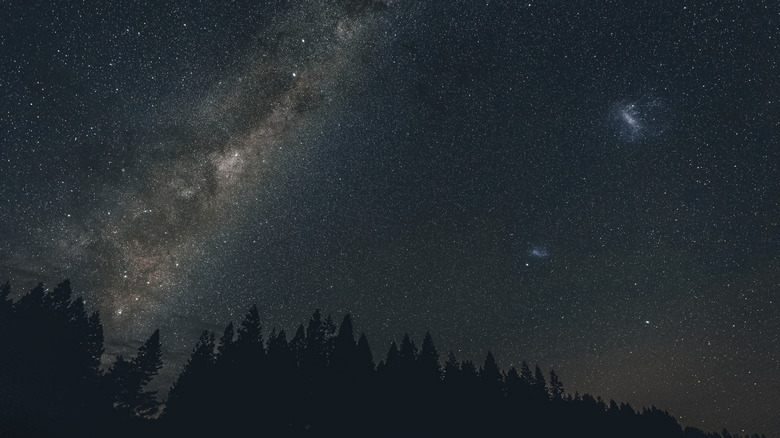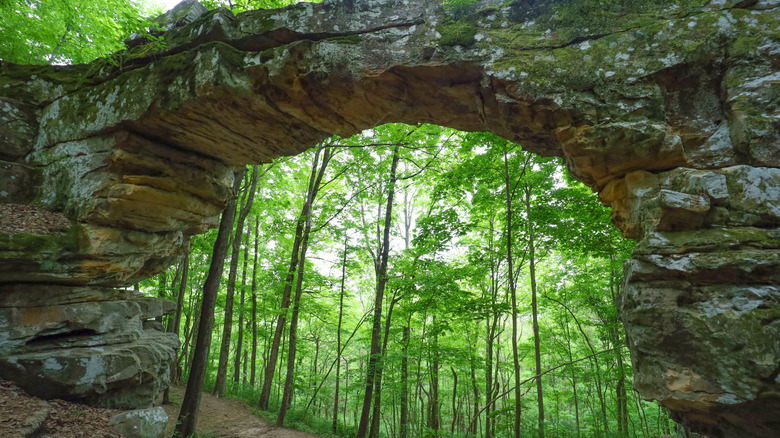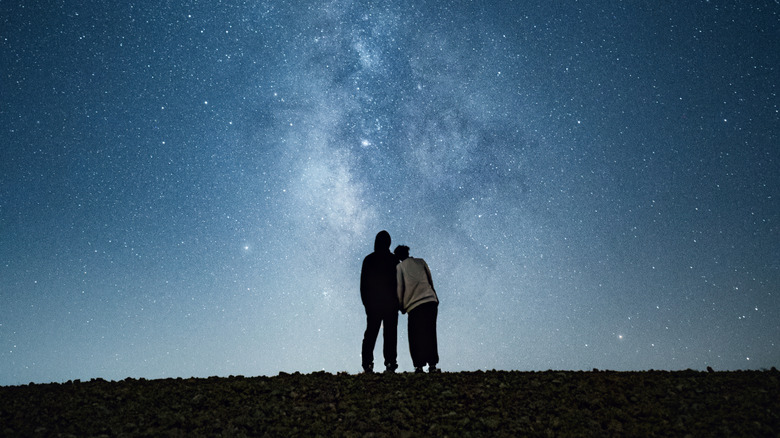One Of Tennessee's Dark Sky Parks Has Miles Of Scenic Trails And A Jaw-Dropping Rock Arch Over A Lake
Light pollution is a serious problem for our modern society. Not only does it take away our ancient sense of wonder and awe about the cosmos, studies have shown that light pollution messes with our circadian rhythms and even raises the risk of depression and other psychiatric disorders. It also causes serious harm to entire ecosystems that rely on the natural darkness of the night skies to function. So it's no surprise that dark sky initiatives are cropping up all over the country. In fact, Oregon's impressive answer to the Australian Outback is now the world's largest dark sky sanctuary, and in 2017, a world-class Idaho camping destination was designated America's first gold-tier international Dark Sky Reserve by the U.S.-based nonprofit DarkSky International.
But you don't have to travel out West to find one of these sanctuaries. If you're living in the eastern United States, head to Tennessee's Pickett Civilian Conservation Corps Memorial State Park and Pogue Creek Canyon State Natural Area for some of the best stargazing east of the Mississippi. Together, the two parks were designated a silver-tier International Dark Sky Park by DarkSky International in 2015. Spanning 1,618 hectares, this combo dark sky location is one of the best spots for stargazing in the entire Southeastern United States, an area of the country that has struggled with light pollution.
By day, Pickett and Pogue parks are ruggedly beautiful escapes into the wild, with a forested plateau of sandstone bluffs, narrow canyons, waterfalls, and caves. Dozens of miles of trails crisscross the parks, which also feature an abundance of campsites and rustic cabins that make the perfect base for stargazing. Here's how to make the most of a visit, whether by day or night.
Stone bridges and canyons in Tennessee's Dark Sky Park
Even if you're heading to the area for night sky viewing, you can't go wrong by starting off with some daytime adventuring. Pickett Memorial State Park spans 12,000 acres of bluffs, caves, and arches, with none more famous than the stone arch over Arch Lake (sometimes referred to as Pickett Lake). Visitors can kayak, canoe, or paddleboard beneath the arch before relaxing on the small beach in the park for a dip in tree-lined waters. Boats are available to rent at the park's visitor center from 8 a.m. to 4 p.m.
Pickett's 50-plus miles of trails are their own reward. Island Trail, Natural Bridge Trail, and Ridge Trail are all short, easy-to-moderate hikes that lead to otherworldly natural stone arches in the forest. The archway along the Natural Bridge Trail is particularly impressive, spanning over 80 feet and rising 35 feet above the ground. The park also features 26 campsites available for a $5 reservation fee, and dozens of cabins that visitors can rent, starting at around $100 per night. Cabins 1 and 4 are charming, wood-shingle structures, while cabins 2, 3, and 5 are historic stone cottages. Both types were built by the Civilian Conservation Corps in the 1930s and are an ideal way to immerse yourself in the park's natural atmosphere.
Nearby Pogue Creek Canyon State Natural Area is a 3,000-acre playground that adds even more dramatic terrain to explore. Colorful sandstone arches, bluffs, caves, and overhangs dominate the landscape, and a handful of trails wind through the area. Follow the forested path that leaves the gravel parking lot off Highway 154 to reach the Overlook Trail, a 2-mile, hour-long walk that serves up some spectacular views of the canyon walls.
Enjoy Tennessee's best stargazing
After a day of hiking through the forests and across stone bluffs, it's time to throw your blanket down and watch the skies transform into a nighttime celestial theater. Pickett-Pogue Dark Sky Park features a designated astronomy field that's located near the Pogue Creek Canyon State Natural Area's parking lot just off Highway 154. The Tennessee State Park Service holds stargazing parties throughout the year, so contact the park office ahead of time to ensure you get the kind of experience you're expecting when you arrive.
To make the most of the night, come prepared. Bring blankets and folding chairs, season-appropriate layers, and bug spray. Red-light flashlights are essential while stargazing, as they don't neutralize the sensory protein in our eyes that allows for maximum light sensitivity at night. The benefits of this protein fully kick in 30 minutes to an hour after being immersed in darkness, and even a few seconds of white or yellow light can restart the process.
If you prefer more comfortable accommodations than the park's campsites and cabin lodging can provide, there are a handful of inns and guesthouses in nearby Jamestown and plenty of rustic but fully modern lodges scattered throughout the surrounding northern Tennessee region. You'll need a car to explore the area. The Dark Sky Park is located around 150 miles northeast of Nashville International Airport, making it an easy two to three-hour drive (and while there you can check out the beloved local Instagram tour through Nashville's artsiest neighborhoods for a fun side quest). Summertime viewing is tough to beat, but fall and winter offer crisp night air and crystal clear skies. Check the forecast before you head out and enjoy immersing yourself in one of humanity's most ancient traditions.


